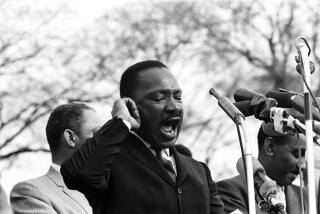The Dream and Beyond
- Share via
Anyone celebrating today’s Martin Luther King Jr. national holiday ought to pause for a moment to acknowledge what King himself, were he still alive today at 74, would be doing almost every waking hour of the day: organizing mass demonstrations opposing the U.S. government’s incipient attack upon Iraq.
Although many hypothetical questions about what King would do today cannot be answered because so much has changed since his death 35 years ago, King’s track record against militarism was so strong and stark that the position he would have taken in 2003 is unquestionable.
Even before he was awarded the Nobel Peace Prize in 1964, King believed that any ethic of nonviolence had to apply internationally as well as domestically and to government policies as well as personal conduct. Receipt of the prize, however, significantly intensified King’s belief that he had an obligation to speak the prophetic truth about nonviolence and social justice, irrespective of whether his truths would be popular with Americans in general or even with African Americans.
That belief undergirded King’s decision to speak out insistently, and sometimes harshly, about the Vietnam War. In one 1967 speech, King went so far as to denounce the U.S. government as “the greatest purveyor of violence in the world today.”
At that time, criticism of a Vietnam policy that had been pursued by liberal Democratic presidents John F. Kennedy and Lyndon B. Johnson came only from the political fringe. But King was not deterred.
“Someone of influence has to say that the United States is wrong, and everybody is afraid to say it,” King told a friend in a phone conversation wiretapped by the FBI. “Not to act,” he added publicly, “represents moral irresponsibility.”
Since the advent of the King holiday two decades ago, celebration of King’s life and legacy has increasingly downplayed or overlooked those aspects of his political message that were unpopular in 1967-68 and would still be unpopular were he here to give voice to them today.
King privately identified himself as a democratic socialist and publicly called time and again for “a radical redistribution of economic and political power” within the U.S. Yet that part of King’s legacy is rarely highlighted, as is likewise true for his harsh criticisms of American militarism abroad. A portrayal of King that is limited simply to the least controversial portions of his 1963 “I Have a Dream” speech is the most universally palatable, but King understood his own calling as requiring him to emphasize, not ignore, those political messages that would be most contentious.
So, on the cusp of what appears to be an all-but-certain U.S. military attack on Iraq, anyone celebrating King’s legacy ought to recall not only “I Have a Dream” but his 1967 warning that Washington’s continued pursuit of aggressive militarism would leave the U.S. “morally and politically isolated.”
King’s teachings can have real meaning for us today, but only if we choose to acknowledge them.
More to Read
Sign up for Essential California
The most important California stories and recommendations in your inbox every morning.
You may occasionally receive promotional content from the Los Angeles Times.













